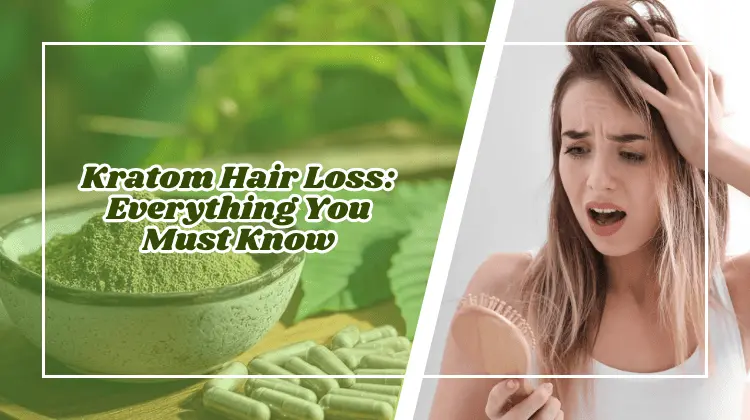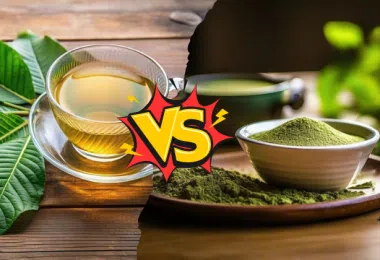
The Ultimate Guide To Red Thai Kratom Capsules
Are you also confused about which Kratom form you should try for your busy schedule?...
View PostYour cart is currently empty.
Continue Shoppingor 4 interest-free payments with 

Concerns around kratom hair loss have quietly gained attention in online forums and user communities. Many people have started to notice more hair strands on their pillow or in the shower and are now asking: “Does kratom cause hair loss?”
Kratom has become surprisingly popular in the U.S., with an estimated 1.7 million Americans aged 12 and older using it for mood, focus, or pain relief. But alongside all the good stories, this new question is gaining attention on health blogs and forums, leaving many understandably concerned. Although there isn’t solid evidence showing that kratom directly leads to hair loss, a few users have reported hair shedding after regular use, which keeps the debate alive and confusing.
In this article, we’ll break down what real research says, look at possible indirect reasons some people might see changes, and clear up the most common myths spreading online about Kratom hair loss.
Kratom is derived from the leaves of the Mitragyna speciosa tree, which grows naturally in countries such as Thailand, Indonesia, and Malaysia in Southeast Asia. For generations, local communities have chewed the fresh leaves or brewed them into tea as part of daily routines, often to feel more alert during long days or to relax afterward.
According to the National Institute on Drug Abuse (NIDA), kratom isn’t officially classified as an opioid. Still, some of its natural compounds do interact with the same receptors in the brain, which helps explain why people often describe its effects as somewhere between gentle stimulation and calm focus.
While kratom has gained attention far beyond Southeast Asia, especially in the U.S., research into its long-term effects, including anything connected to hair, remains limited. The lack of detailed studies has led to numerous debates and myths online, as personal stories often circulate without a clear scientific context.
Right now, there’s no scientific proof that kratom itself directly causes hair loss. Researchers haven’t found evidence that its natural compounds damage hair follicles or alter the normal growth of hair.
There is, however, one small survey people often mention. In 2020, 143 kratom users were asked about their experiences, and about 5.6% reported noticing extra shedding. It’s essential to note that this was based on personal reports, without medical confirmation of what caused the shedding.
Large-scale studies that specifically look at kratom and hair are still missing. Most of the research so far has focused on other questions, like how kratom’s plant compounds interact with specific brain receptors rather than its effect on hair.
What science does tell us, though, is that hair can reflect specific changes happening in the body. For example, a review published in the National Institutes of Health library (PMC4657101) explains how higher cortisol levels, often linked to ongoing stress, can be measured in hair strands. This supports what many experts already know: stress can influence hair growth cycles itself.
Overall, while no studies show kratom directly damages hair, it’s possible that stress, lifestyle changes, or other unrelated factors could indirectly contribute to shedding in some people. More targeted research would be necessary to understand any real connection fully.
Scroll through forums or social media, and you’ll see plenty of stories from people who say they noticed more hair shedding after adding kratom to their routine. These personal accounts often spark questions and worry, even though research hasn’t confirmed a direct link.
Part of why these ideas stick around is how kratom works in the body. According to the National Institute on Drug Abuse (NIDA), kratom contains natural compounds that interact with some of the same brain receptors as certain medicines. People describe its effects as mildly energizing [1] or calming [2], depending on the amount. While many choose kratom for reasons like daily focus or mood, these are self-reported experiences rather than results from extensive, controlled studies.
When exploring the effects of kratom, many people come across unexpected concerns—one of them being kratom hair loss. While kratom has gained popularity for various reasons, some users have raised questions about whether it could be linked to changes in hair thickness or shedding. In this article, we take a closer look at what’s being said, what’s known, and what might be worth considering when it comes to kratom and its possible connection to hair health.
Indirect link through diet: Kratom itself hasn’t been proven to directly damage hair follicles. However, heavy or long-term use can sometimes reduce appetite or cause stomach upset, leading to poor nutrient absorption, which may be more common in those with a higher tolerance. If that sounds familiar, here are some effective ways to lower or reset your kratom tolerance.
Malnutrition risk: If you’re eating less or not absorbing enough nutrients because of kratom, your body may lack essential vitamins and minerals that keep hair strong and healthy.
Signs to watch for:
What to do:
When to see a doctor:
Many diet-related hair shedding issues can be reversed once you identify and address the root cause.
Should You Worry About Kratom and Hair Loss? Right now, there’s no scientific proof that kratom itself directly causes hair loss. Most stories online originate from personal experiences rather than research, and hair shedding can occur for many unrelated reasons, such as stress, seasonal changes, or shifts in routine. Until more studies are done, there isn’t enough evidence to say that kratom alone is the cause.
There is no clear scientific proof that kratom directly causes hair loss. Most reports come from personal stories, which don’t show whether kratom itself is the reason.
Right now, research hasn’t confirmed a direct link. That’s why many experts consider it more of a kratom hair loss myth rather than a proven fact.
Some users share stories online about seeing more hair fall after taking kratom. But without extensive studies, it’s hard to know if kratom causes hair loss or if other factors played a role.

Are you also confused about which Kratom form you should try for your busy schedule?...
View Post
When discussing ‘Kratom Tea vs Powder,’ you must understand that Kratom tea is brewed from...
View Post
Kratom Liquid vs Capsules: A Complete Comparison Guide Are you also confused between Kratom Liquid...
View PostBy clicking yes you also confirm that you have read and agree to GoldenMonk's Terms of Service and Privacy Policy and Goldenmonks’s service provider’s terms of service and privacy policy.